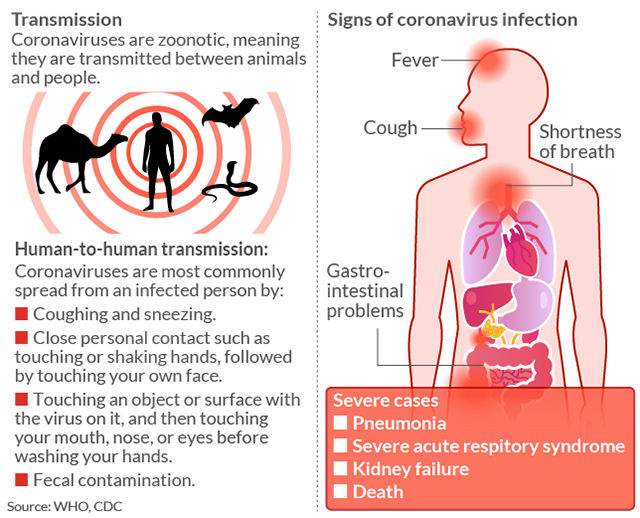Some outlandish rumors about COVID-19, the disease caused by the new virus SARS-CoV-2, still persist, and continue to percolate on the internet: To some, it’s a dastardly bioweapon designed to wreak economic armageddon on the West; a left-wing conspiracy to damage the reelection prospects of President Trump; a virus that leaked from a Wuhan laboratory.
Such paranoid speculation is at the very least unhelpful, health professionals say, and only serves to politicize a global public-health emergency and distract from potentially life-saving measures to contain and/or slow the spread of coronavirus. After reportedly jumping from animals to humans at a food market in Wuhan, China in early December or before.
Conspiracy theories politicize a public-health emergency and distract from potentially life-saving measures.
As the world struggles to come to terms with the prospect of COVID-19 changing the way we socialize and work, people are left wondering whether the financial markets have had a massive overreaction to yet another virus that will eventually fizzle out, or whether it’s time to buckle down and heed warnings of the disease’s seriousness issued by governments and health authorities.
Here, MarketWatch breaks down the facts and fiction of the global pandemic:
Is coronavirus airborne like measles?
Airborne transmission is “plausible,” according to a study published in the print edition in the peer-reviewed The New England Journal of Medicine this week from scientists at Princeton University, UCLA and the National Institutes of Health. The researchers concluded that the virus could remain airborne for “up to 3 hours post aerosolization.”
The scientists found that SARS-CoV-2, the virus that causes the new disease COVID-19, was detectable in the air for up to three hours, up to four hours on copper, up to 24 hours on cardboard, and up to two to three days on plastic and stainless steel. For those reasons, officials recommend washing hands, cleaning surfaces and “social distancing” in public spaces.
It’s recommended that you remain at least six feet apart from other people, especially indoors, experts say. “Studies have looked at how far spit and little droplets fly, and that’s the magic number,” said Luis Ostrosky, vice chairman of internal medicine at McGovern Medical School in Houston.
Dispatches from the front lines of a pandemic: ‘They’ve likened it to a war where the number of casualties just keep on coming’: Italians find solidarity, resilience and music during the coronavirus lockdown
How long can it live in your bathroom?
“It’s not certain how long the virus that causes Coronavirus survives on surfaces, but it seems to behave like other coronaviruses,” the World Health Organization said. “Studies suggest that coronaviruses — including preliminary information on the COVID-19 virus — may persist on surfaces for a few hours or up to several days.”
Higher temperatures, based on earlier coronaviruses, are likely to degrade it. But experts caution that — as spring arrives in the Northern Hemisphere, which usually marks the end of the traditional flu season — this novel coronavirus may not necessarily go away in warmer weather. It is from a different family of viruses than the flu, and it is highly contagious.
Its life span will also vary, depending on the type of surface, temperature and/or humidity. Bathrooms are a welcoming environment for coronaviruses. “Previous coronaviruses can remain viable in cold, moist surfaces up to nine days,” Ostrosky said. So if you are sharing a home with someone who has coronavirus, he strongly advises against sharing the same bathroom.
 Associated Press
Associated Press Will recirculated air on a plane make me sick?
In-flight oxygen is probably of higher quality than the air in your home. “If you have an infected person in the front of the plane, and you’re in the back of the plane, your risk is close to zero simply because the area of exposure is thought to be roughly six feet from the infected person,” according to Charles Chiu, professor of laboratory medicine at University of California, San Francisco.
“Ventilation rates provide a total change of air 20 to 30 times per hour,” the WHO says. “Most modern aircraft have recirculation systems, which recycle up to 50% of cabin air. The recirculated air is usually passed through HEPA (high-efficiency particulate air) filters, of the type used in hospital operating theatres and intensive care units, which trap dust particles, bacteria, fungi and viruses.”
President Trump last week said he was “marshaling the full power of the federal government” by suspending travel for non-U.S. citizens from Europe to the U.S. for 30 days, later extending it to the U.K. and Ireland, a measure aimed at stopping sick people spreading COVID-19. “We made a lifesaving move with early action on China. Now we must take the same action with Europe,” he said.
Dispatches from the front lines of a pandemic: ‘The lack of an all-island response has also rattled communities on both sides of the Irish border.’ Pubs close due to coronavirus, government issues new strict rules for funerals
Are men more affected by this than women?
“Men do tend to be more affected than women and their symptoms are often more severe,” Ostrosky said. “Estrogen has a protective effect. When scientists block estrogen production in animals, they become more susceptible to coronaviruses and they get worse symptoms.” He added, “But please don’t take estrogen injections or pills. If you are a man, they will not help you.”
Italy had 59,138 confirmed cases, as of Sunday evening, and has had the worst nationwide outbreak after China (81,432 cases). In Italy, the average age of those who have died from COVID-19 in Italy is 80.3 years old, and only 25.8% are women, according to Silvio Brusaferro, legal representative at the Istituto Superiore di Sanità. Italy also has the oldest population in Europe.
Is there a gender difference when it comes to influenza? “No, with the flu it’s pretty even,” Ostrosky said. The two illnesses have similar symptoms, including a sore throat and coughing. Coronavirus is a type of virus common in humans and animals, and causes mild-to-moderate respiratory illnesses. But in very severe cases it can travel through your body and damage other organs.
 MarketWatch photo illustration/iStockphoto
MarketWatch photo illustration/iStockphoto Do face masks guard against coronavirus?
Face masks help prevent patients from spreading the virus, but they don’t protect the healthy, the Centers for Disease Control and Prevention say. They can help act as a barrier if a sick person coughs or sneezes. “Most face masks do not effectively filter small particles from the air and don’t prevent leakage around the edge of the mask when the user inhales,” the CDC adds.
Face masks are needed for health-care professionals. N95 masks are tighter-fitting than surgical masks and protect against small particles and large droplets, according to the CDC. Health and Human Services Secretary Alex Azar said that there are only 30 million N95 masks in the national stockpile, and “as many as 300 million masks are needed in the U.S. for health-care workers.”
Dispatches from the front lines of a pandemic: As coronavirus cases rise in Switzerland, residents keep wary eye on Italy’s worsening situation next door
Should I cancel my movie and dinner date?
Whether you’re on a plane or a train, you are at risk of contracting coronavirus, especially if you are seated near an infected person and/or you touch a contaminated surface and then your face without properly washing your hands. However, WHO says there’s no difference between sitting in a restaurant, office or movie theater: If you’re near an infected person, you’re at risk.
While you can’t do much about being seated next to an infected passenger on a plane at 30,000 feet, you can exercise responsible “social distancing,” Ostrosky said. “The more people who are in that enclosed space with you, the higher the risk you have of being exposed to someone who is sick,” he added. “If we had to rank them, there is an increased risk in larger groups.”
Wasn’t coronavirus already a pandemic?
Not technically. The WHO has declared COVID-19 a global pandemic. An outbreak is deemed to have become a pandemic when it has spread from human-to-human on several continents, while an epidemic is a disease that infects regions or a community over a large geographical area. “We’re deeply concerned,” WHO head Tedros Adhanom Ghebreyesus told reporters last week.
But wasn’t coronavirus already a pandemic, given that it had reached approximately 130 countries by that time? Not quite. There’s subjectivity involved in designating an epidemic a pandemic, and epidemiologists finally agreed that the efforts to contain the virus had failed. In other words, it’s now a matter of containing the spread and slowing it down to give scientists time to work on a vaccine.
As of Sunday evening, there were 335,997 confirmed cases and 14,641 deaths worldwide, according to data from the database of Johns Hopkins University’s Center for Systems Science and Engineering; the database also reported 98,333 recoveries. The U.S. has had at least 33,276 confirmed coronavirus cases and 417 deaths, John Hopkins added.
(This story was originally published on March 12 and updated with new coronavirus data.)
How COVID-19 is transmitted

div > iframe { width: 100% !important; min-width: 300px; max-width: 800px; } ]]>









